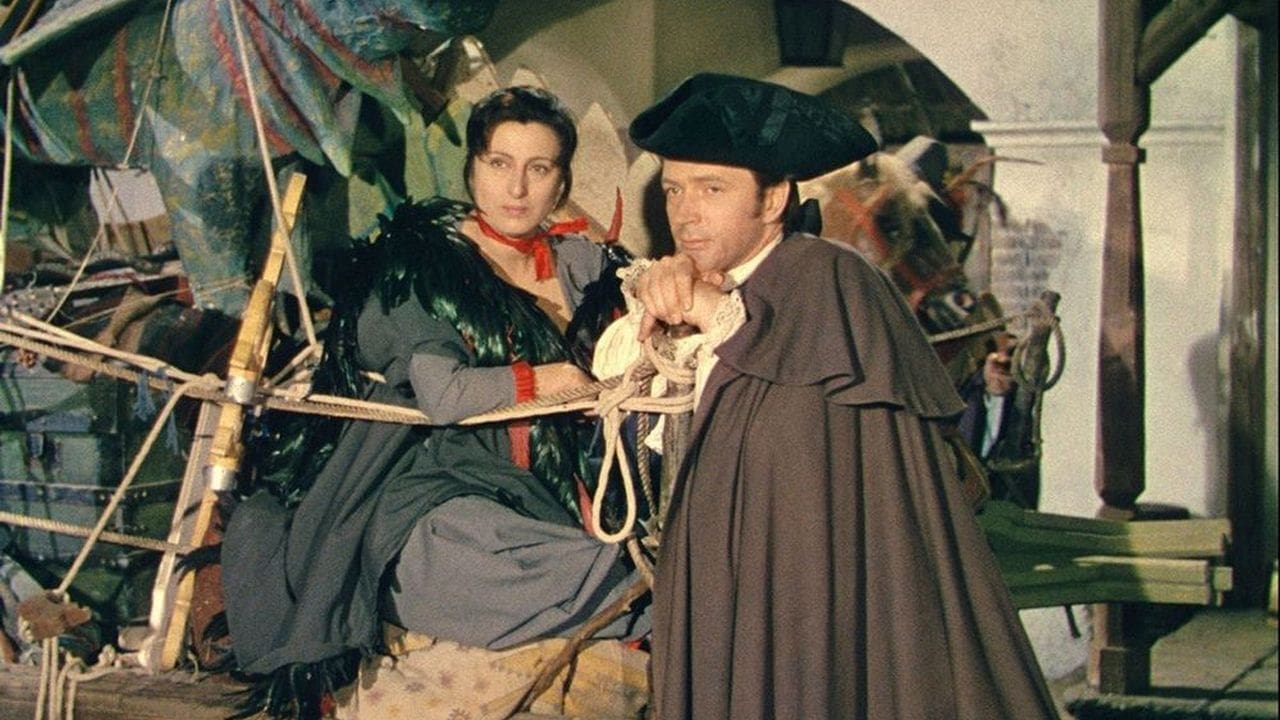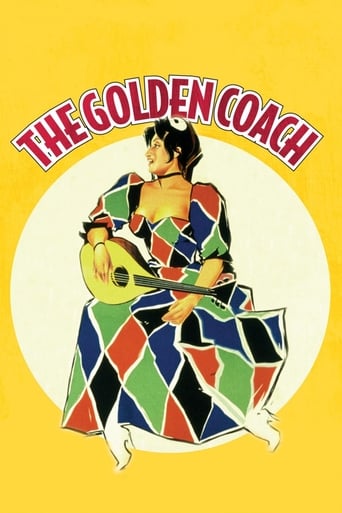

It is the film of Anna Magnani. and that is far to be a surprise. because it represents not only charming reconstruction of Commedia dell' Arte but the chance to admire a precise way to build the seduction of a woman discovering herself. it is a Jean Renoir film and his mark is obvious in each scene. it is the film of a great show and bitter commedy. but , if you see it with more profound interest, you have the chance to discover a profound exploration of art, society and significant things. and that transforms it in one of usefull films escaping from the circle of specific genre. because, in essence it is a wise parable about the clash between life and art.
... View MoreI saw 'The Golden Coach' twenty years ago in a big screen revival. I don't recall that I liked it or disliked it. Actually, I don't recall much about it at all. So I thought I'd watch it again, now that I have hundreds of really great films under my belt ...and I see why nothing stuck in my head. It's trying very hard to be important; by rejecting the usual Hollywood treatment and pacing. But it dilly-dallies with a static, indifferent structure wherein Anna Maganani pinballs between three men who are after her. If I had the patience I could scour this for the transitory meaning of objects (No thanks, I'll take "The Earrings of Madame de...") but the apparent level of the movie never drew me in, so I'm not especially interested in the underpinnings.I have never understood the appeal of Magnani. She is a a brassy, loud mouth vulgarian, and a turn-off of epic proportions. She's clearly approaching her over-ripe, matronly years here, and the idea that 3 men could fall all over themselves for her is absurd. Her trademark in this film is some full-throated proectile laughter which probably broke a lot of objects downwind. They seem to be cashing in on her laugh. It's as if crowds adored in in a breakout role the previous year (where she laughed once) and this was conceived as the merest excuse to have her laugh like a jackal every 4 minutes.On the set of the Fugitive Kind she was reportedly incensed, and increasingly unhinged because Brando did not find her attractive, nor have a tryst with her. The lady does not seem to have understood her limitations. She was lucky to have the career she did. She peaked with her first film, where she played a care-worn wartime schlub/housewife.
... View MoreFor the first 102 minutes, I saw this film much as MATTHEWSCOTT8: a pleasant movie that was charming and colorful, but otherwise ordinary. The final minute, however, is transcendent and elevates the entire work to something else. (The only other example of this I can think of is John Huston's "The Dead" where the final voice over forces you to reevaluate everything that have come before in a new light).Here is one interpretation of the the events of the last minute and their meaning:A player steps to the edge of the stage, beyond the curtain. He reveals the cosmological structure of this play within a play within a film. The first play is the "real world" where ordinary events occur and characters interact. Most pursue some narrow selfish objective, but on rare occasions one overcomes their greed and achieves a degree of liberation and fulfillment (in this case Camilla).The second play is the stage on which the our narrator stands; a kind of Bardo between the fist play and our audience. The audience is a sea of human souls - all those who have passed away as their personal play has ended.The narrator tells us that Camilla is missing. In the background we see her pale ghostly image as she bids farewell to remaining cast members.The narrator then gives us his philosophy of life, "Don't waste your time on the so called real life. You belong to us"..." the only way to find happiness is on any stage"... "during those two little hours when you become another person; your true self." Thus, even a fairly standard story offers the potential to transcend our plight and experience something eternal. Renoir is describing the essence of pure eastern mysticism, here in a deeply western European context."Filipe, Ramon and the Viscount have disappeared. Gone." says Camilla, "Don't they exist anymore?"."Now they are part of the audience. Do you miss them ?" asks our narrator.Overall, this ending is so quick and unexpected that is feels like a rabbit punch to awaken the spirit. We are left, like Camilla, to contemplate the play, the nature of all plays and our own existence.
... View MoreThis film is really a masterpiece. This was also French director François Truffaut's opinion, and he named his film company "Les Films du Carrosse" as a tribute to it. I once read a review in which the critic expressed the opinion that Anna Magnani's looks couldn't make it likely that the male characters of the plot fell in love with her. But this is a complete misunderstanding of the story, it is not because of her beauty they love her, but because she makes them laugh, she brings them to that other world which theater creates. For aren't we all made of the same stuff dreams are made of, as the great Will once wrote?... If you haven't seen this film, don't wait if you get a chance to watch it. In France, where I live, it's not available in DVD yet, but since it recently came out in the US, and in Japan, I am looking forward to soon finding it here.
... View More